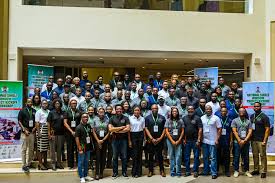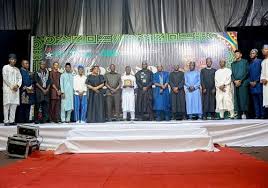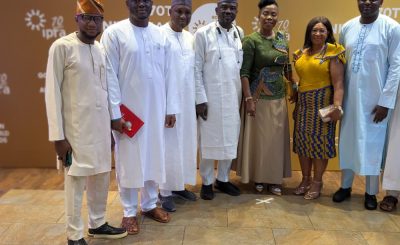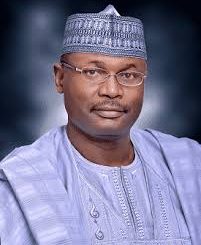By Stephen Ubanna
When Adegboyega Oyetola, a former governor of Osun state and now minister of marine and blue economy, remarked in late November 2024, that the ministry had commenced engagement with the relevant government agencies including the Nigeria Customs Service, NCS, under the close watch of Bashir Adewale Adeniyi, MFR, for the rollout of the National Single Window, NSW, Initiative, stakeholders heaved a sigh of relief.
Going by the roadmap of the NSW project, it is expected ‘’to eliminate human interface and deepen efficiency of the country’s seaports.
Wale Edun, minister of Finance and Coordinator of the Economy, had given his words that the NSW, Project ‘’will streamline the country’s import and export trade processes, reduce bottlenecks and increase transparency that will position Nigeria for unprecedented economic growth’’, when he Launched NSW project.
The minister who had repeatedly said at various forums and Workshops organized by the NSW Project Secretariat, had asserted that’’ it is poised to witness a significant leap in the country’s trade facilitation drive’’, noting that all identified bottlenecks and inefficiencies in the country’s import and export processes are expected to be removed as there are opportunities for improvement.

The recent NSW event, which according Abdullahi Aliyu Maiwa, an Assistant Comptroller and the Customs spokesperson, which had participants drawn from the relevant ministries, particular, marine and blue economy, including Trade, Industries and Investment and other Federal Government agencies, import and export sectors and trade associations, had featured a panel discussion on ‘’global benchmarking, coordination, and cooperation among trade actors ‘’.
The Customs spokesperson confirmed that the NSW Workshop also featured an interactive question and answer sessions that had allowed the participants ‘’to engage directly with the project leaders’’.
The Project Leaders may have used opportunity provided by the Workshop to give an insight that ‘’NSW was designed to allow importers and exporters to submit all required trade documents through a single digital portal, connecting all the relevant government agencies and further reducing bottlenecks in the clearing process at the nation’s seaports’’.
Speaking at the one- day NSW Workshop, organized by the project Secretariat and the NCS, in Lagos, the Nation’s Commercial nerve center, ACG Mohammed Bbandede, National Coordinator, Lagos Zone A, office, who had represented Adeniyi, the Customs Comptroller General, had reechoed minister Oyetola’S claims that the scheme is aimed at’’ simplifying Nigeria’s import and export processes through a unified digital platform’’.
The ACG, who could not his feelings had averred that the success of NSW project ‘’requires collaboration and adaptability from all players in the trade ecosystem’’. He had sounded it loud and clear to those who cares to listen that ‘’the success of the NSW project, does not rest on the shoulders of the Federal Government alone ‘’ but requires stakeholders’ openness to change and willingness to adopt new ways of working and patience as we navigate the inevitable challenges that come with any major transformation’’. He did not stop there.
He had added that’ ’improving efficiency at the nation’s seaports would go a long way to enhance its competitiveness and predictability for manufacturers and traders’’ with other competitors in the West and Central African sub-regions.
The Customs Zonal Coordinator was emphatic that the more stakeholders make the Lagos ports of Apapa, Tin-can Island, Port Multiservice Terminal Limited, PTML, Kirikiri Lighter Terminal, phases I and II, and the south eastern ports of Onne, Rivers Port, Port Harcourt, Warri and Calabar ports, competitive, the country’s manufacturers and traders would be able to predict the outcome of their products pushed into the Nigerian and West coast markets.
Tola Fakolade, Director of the NSW project and Head of the Secretariat where policies are made and decisions taken, had highlighted the importance of the engagements with stakeholders to keep them informed on the Secretariat next line of actions. He had disclosed at the Lagos Workshop that plans are under way for the launching of the first phase of the NSW project in March, 2026.
He may have gladdened the heart of the stakeholders when he declared that as the NSW, Secretariat staff, are getting closer to the Launching of the first phase of the project in March,2026, it is very necessary to keep the key stakeholders well-informed about what ‘’they are doing and how the NSW project is going to impact on what do’’.
The planned Launching of the first phase of the NSW project in March, 2026, is expected to be followed quickly with the Launching of the second phase while the Launching of the third and last phase of the project has been slated towards the tail end of 2026.
Kingsley Igwe, the Registrar, Council for the Regulation of Freight Forwarding in Nigeria, CRFFN, in his remarks, during the NSW project Workshop in Lagos, had described it as ‘’vital to Nigeria’s participation in the African Continental Free Trade Area, AfCTA’’.
He noted that the NSW, has become imperative for Nigeria’s participation in AfCTA, by ensuring that its trade processes aligns with continental and global best practices. The best practices, he had alluded to includes reducing costs and integrating free trade agreements into the NSW, system through the B’Odogwu platform, described by Kikelomo Adeola, a Deputy Comptroller General, DCG, overseeing the Information, Communication and Technology, ICT and Modernisation, Department, at the Customs Headquarters, as a Customs initiative and national system designed’’to enhance trade efficiency’’.
The B’Odogwu platform, which was an indigenous technology, initiated by the Trade Modernisation Project Limited, TMP, which has a 20-year agreement with the NCS, had replaced the Nigerian Integrated and Customs Information System, NICIS, II, a foreign technology, initially operated and managed by WEBB Fontaine, on behalf of the Service, ‘’to enhance effective classification of imports and exports as well as duty payments’’.
The system which had already been expanded to the Apapa, Tin-can Island and Onne ports, after the successful pilot phase at PTML, an insider confirmed has successfully ‘’enhanced trade facilitation, transparency and efficiency at the ports where is currently being implemented.







